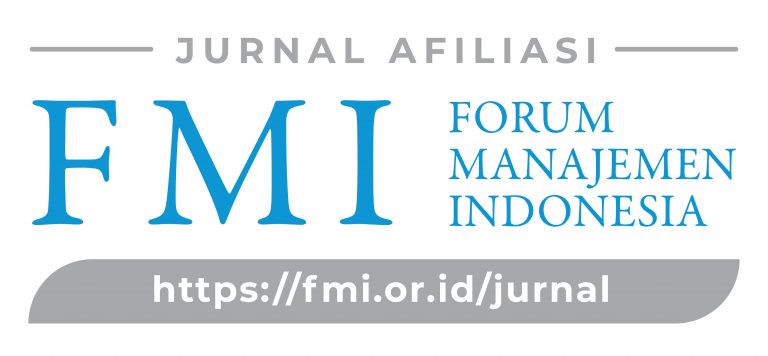ANALISIS PENGARUH IKLIM ORGANISASI, SERVANT LEADERSHIP, DAN INTRINSIC MOTIVATION TERHADAP ORGANIATIONAL CITIZENSHIP BEHAVIOR (OCB) PADA PT. BIOMETRIK CITRA SOLUSI
DOI:
https://doi.org/10.55732/unu.gnk.2022.04.1.1Keywords:
Organization Climate Servant Leadership, Intrinsic Motivation and Organizational Citizenship BehaviourAbstract
The increasingly fierce business competition makes companies have to make the right strategy within the company, especially strategies related to improving employee performance. The aim of this research is to find out how much influence organizational climate, servant leadership, and intrinsic motivation have on organizational citizenship behavior (OCB). This study uses quantitative research methods and SPSS data processing using regression analysis and 36 respondents. The results of data processing show that there is an influence of organizational climate, servant leadership, intrinsic motivation on Organizational Citizenship Behavior (OCB) both simultaneously and partially.
References
Agus, S. (2007). Hubungan Antara Iklim Organisasi Dengan Perilaku Di Luar Peran Kerja Pada Dosen Politeknik Negeri Semarang (Fakultas Psikologi Universitas Diponegoro Semarang). In Fakultas Psikologi Universitas Diponegoro Semarang. http://eprints.undip.ac.id/10446/1/agus_susilo-M2A_001_003.pdf
Anwar, C. (2021). Pengaruh Insentif Dan Motivasi Terhadap Kinerja Karyawan ( Pada Pt . Tasindo Central Perkasa Kecamatan Tanggulangin Kabupaten Sidoarjo ). Greenomika, 3(1), 30–35. https://journal.unusida.ac.id/index.php/gnk/ article/view/467
Ariani, D. W. (2007). Model Hubungan Motif, Modal Sosial, dan Kepribadian dengan Perilaku Kewargaan Organisasional : Kasus Pada Industri Perbankan di Indonesia. Telaah Bisnis, 8(2).
Aziza, N., & Andriany, L. M. (2021). Pengaruh Kecerdasan Emosional Dan Spiritual Terhadap Kinerja Perawat Dengan Organizational Citizenship Behaviour Sebagai Variabel Intervening. Jurnal Manajemen Dan Profesional, 1(01), 50–65. https://doi.org/10.32815/jpro.v1i01.344
Barbuto, J. J. (jay), Brown, L. L., Wilhite, M. S., & Wheeler, D. W. (2001). Testing the Underlying Motives of Organizational Citizenship Behaviors: A Field Study of Agricultural Co-Op Workers John. Annual National Agricultural Education Research Conference, January 2001, 539–553.
Ebener, D. R., & O’Connell, D. J. (2010). How might servant leadership work? Nonprofit Management and Leadership, 20(3), 315–335. https://doi.org/10.1002/NML.256
Ehrhart, M. G. (2004). Leadership and procedural justice climate as antecedents of unit-level organizational citizenship behavior. Personnel Psychology, 57(1), 61–94. https://doi.org/10.1111/J.1744-6570.2004.TB02484.X
Fanis, Astria Tika, Fitria Rahmi. (2017). Pengaruh Iklim Organisasi terhadap Organizational Citizenship Behavior pada Karyawan Bank X. Jurnal RAP, Vol 7 (1) (2016). https://doi.org/10.24036/rapun.v7i1.6602
Liden, R. C., Wayne, S. J., Zhao, H., & Henderson, D. (2008). Servant leadership: Development of a multidimensional measure and multi-level assessment. The Leadership Quarterly, 19(2), 161–177. https://doi.org/10.1016/J.LEAQUA.2008.01.006
Neubert, M. J., Kacmar, K. M., Carlson, D. S., Chonko, L. B., & Roberts, J. A. (2008). Regulatory Focus as a Mediator of the Influence of Initiating Structure and Servant Leadership on Employee Behavior. Journal of Applied Psychology, 93(6), 1220–1233. https://doi.org/10.1037/A0012695
Hindristina, Ni Kadek Berliana Yola. (2021). Pengaruh Kepuasan Kerja, Iklim Organisasi, Komitmen Organisasi, dan Dukungan Organisasional Terhadap Organizational Citizenship Behavior (OCB) Pada Karyawan PT. Kindo Ritel Prima. Jurnal Emas, 2, 1–10. http://repository.unmas.ac.id/journal/detail/ 10411/
Pujianto, W. E. (2021). PENGARUH BUDAYA MUTU, TINGKAT QUALITY OF WORK LIFE (QWL) DAN KNOWLEDGE MANAGEMENT TERHADAP ORGANIZATION CITIZENSHIP BEHAVIOR (OCB):(STUDI PADA KARYAWAN PT. AVIAN AVIA). GREENOMIKA, 3(1), 1-8. Retrieved from https://www.journal.unusida.ac.id/index.php/gnk/article/view/463
Samudi, M., Alifarnia, M., Vahidifar, A., & Zemestani, G. (2012). Investigation of the Organizational Citizenship Behavior Based onthe Organizational Climate in Schools. Journal of Basic and Applied Scientific Research, 2(6), 5765–5772. https://www.textroad.com/pdf/JBASR/J. Basic. Appl. Sci. Res., 2(6)5765-5772, 2012.pdf
Selamat, S. M. (2010). The Relationship Between Intrinsic and Extrinsic Motivation on Organizational Citizenship Behavior (OCB) Among Teachers. [Universiti Utara Malaysian]. https://etd.uum.edu.my/2509/
Sobandi, B., Hidayat, N., & Harijanto, S. (2021). Peningkatan Organizational Citizenship Behavior (Ocb) Melalui Penguatan Iklim Organisasi Dan Adversity Quotient. Jurnal Manajemen Pendidikan, 9 (2), 114–122. https://doi.org/10.33751/JMP.V9I2.4234
Sugiyono. (2010). Statistika Untuk Penelitian (M. P. Endang Mulyatiningsih (ed.)). Alfabeta.
Vondey, M. (2010). The Relationships among Servant Leadership, Organizational Citizenship Behavior, Person-Organization Fit, and Organizational Identification. International Journal of Leadership Studies, 6(1), 3–27.
Walumbwa, F. O., Hartnell, C. A., & Oke, A. (2010). Servant Leadership, Procedural Justice Climate, Service Climate, Employee Attitudes, and Organizational Citizenship Behavior: A Cross-Level Investigation. Journal of Applied Psychology, 95(3), 517–529. https://doi.org/10.1037/A0018867
Yusnita, N., Sunaryo, W., & Yulianti, S. (2021). Improving Organizational Citizenship Behavior (Ocb) Through Strengthening Organizational Climate and Personality. Sosiohumaniora, 23(1), 19. https://doi.org/10.24198/sosiohumaniora.v23i1.
Downloads
Published
How to Cite
Issue
Section
License
Copyright (c) 2022 Lailatul Musyaffaah

This work is licensed under a Creative Commons Attribution 4.0 International License.
Authors who publish with this journal agree to the following terms:
Authors retain copyright and grant the journal right of first publication with the work simultaneously licensed under a Creative Commons Attribution License that allows others to share the work with an acknowledgement of the work's authorship and initial publication in this journal.
Authors are able to enter into separate, additional contractual arrangements for the non-exclusive distribution of the journal's published version of the work (e.g., post it to an institutional repository or publish it in a book), with an acknowledgement of its initial publication in this journal.
Authors are permitted and encouraged to post their work online (e.g., in institutional repositories or on their website) prior to and during the submission process, as it can lead to productive exchanges, as well as earlier and greater citation of published work (See the Effect of Open Access).















